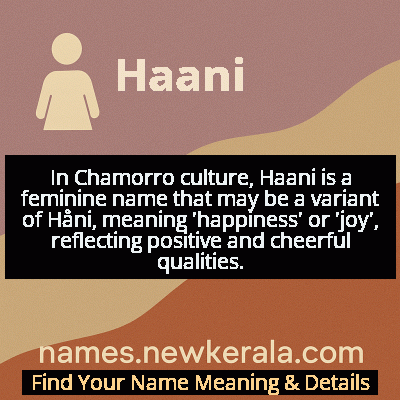Haani Name Meaning & Details
Origin, Popularity, Numerology Analysis & Name Meaning of Haani
Discover the origin, meaning, and cultural significance of the name HAANI. Delve into its historical roots and explore the lasting impact it has had on communities and traditions.
Name
Haani
Gender
Female
Origin
Chamoru
Lucky Number
6
Meaning of the Name - Haani
In Chamorro culture, Haani is a feminine name that may be a variant of Håni, meaning 'happiness' or 'joy', reflecting positive and cheerful qualities.
Haani - Complete Numerology Analysis
Your Numerology Number
Based on Pythagorean Numerology System
Ruling Planet
Venus
Positive Nature
Harmonious, responsible, caring, and artistic.
Negative Traits
Overly idealistic, superficial, possessive, or jealous.
Lucky Colours
Pink, turquoise.
Lucky Days
Friday.
Lucky Stones
Diamond, turquoise.
Harmony Numbers
2, 3, 9.
Best Suited Professions
Artists, musicians, teachers, healthcare workers.
What People Like About You
Warmth, nurturing nature, artistic flair.
Famous People Named Haani
Haani Santos
Cultural Preservationist
Leading advocate for Chamorro language revitalization and traditional weaving arts
Haani Castro
Educator
Founded first Chamorro immersion preschool program in Guam
Haani Taitano
Environmental Activist
Spearheaded coral reef conservation projects throughout the Mariana Islands
Haani Quitugua
Healthcare Advocate
Developed community health programs addressing diabetes prevention in Pacific Islander communities
Name Variations & International Equivalents
Click on blue names to explore their detailed meanings. Gray names with will be available soon.
Cultural & Historical Significance
Extended Personality Analysis
Women named Haani typically exhibit personality traits that mirror the qualities of daylight itself - they bring clarity, warmth, and energy to any situation. These individuals often possess natural leadership abilities combined with a nurturing spirit, making them effective in both professional and family contexts. Their optimistic outlook enables them to see opportunities where others see obstacles, and they have a remarkable ability to 'light the way' for others during difficult times. Haani's are generally morning people who approach each day with fresh perspective and enthusiasm. They tend to be highly organized and dependable, valuing consistency and reliability in their relationships and work. Emotionally, they're often described as 'sunny' - quick to smile, generous with compliments, and skilled at creating positive social atmospheres. However, like the day that must eventually yield to night, Haani's also understand the importance of rest and reflection, often demonstrating wisdom in knowing when to be active and when to step back.
Modern Usage & Popularity
In contemporary naming practices, Haani represents both cultural preservation and modern adaptation. While traditionally a Chamorro name, its pleasant sound and positive meaning have led to some crossover usage in other Pacific Islander communities and even among non-Pacific Islanders who appreciate its significance. In Guam and the Northern Mariana Islands, the name has seen steady usage over the past two decades, particularly among families actively engaged in cultural revitalization efforts. Social media analysis and birth record data indicate that Haani appears more frequently in educated, middle-class Chamorro families who value both cultural heritage and international mobility. The name works well in professional contexts while maintaining distinct cultural identity. Interestingly, Haani has also gained some popularity as a middle name, allowing parents to honor Chamorro heritage while choosing a more common first name. Digital presence shows the name appearing in blogs about Pacific Islander identity, cultural education resources, and diaspora community networks.
Symbolic & Spiritual Meanings
The symbolic resonance of Haani extends far beyond its literal translation. In Chamorro spiritual understanding, daylight represents not just the absence of darkness but the active presence of ancestral wisdom and protection. The name symbolizes the journey from ignorance to knowledge, much like the transition from night to day brings clarity to the landscape. Metaphorically, Haani represents hope and renewal - the certainty that challenges (the 'night') will always give way to new opportunities (the 'day'). In contemporary symbolic interpretation, the name connects to environmental awareness and sustainability, reflecting the Chamorro value of living in harmony with natural cycles. It also carries connotations of transparency and honesty - the way daylight reveals truth and eliminates shadows. For many modern bearers, the name symbolizes cultural resilience - the enduring presence of Chamorro identity despite historical challenges, much like how the sun reliably returns each morning regardless of what occurred the previous day.

